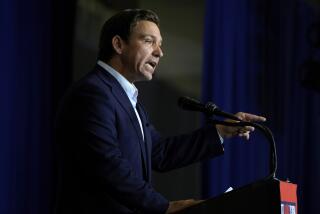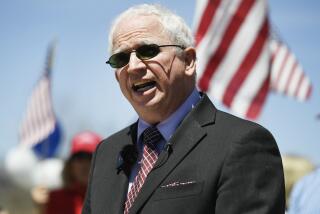Serene Gore Still Optimistic; Florida Justices Set Hearing
- Share via
WASHINGTON — Vice President Al Gore said Tuesday that he believes he still has a 50-50 chance of winning the presidency, but acknowledged that his future rests almost entirely in the hands of the Florida Supreme Court.
That high court Tuesday agreed to hear arguments on Gore’s appeal of a lower court rejection of his bid to overturn official results declaring Texas Gov. George W. Bush the winner in Florida. Attorneys for the two candidates are to submit legal briefs today and present oral arguments at a televised hearing Thursday morning.
Speaking publicly for the first time since he was dealt a double setback in his legal cases on Monday, Gore told reporters: “I don’t feel anything other than optimistic.”
In public, the vice president appeared determined and serene. But in private, Gore’s friends and aides say, he is realistic about the fact that his chances of winning the election may be waning.
“He’s not delusional,” said one longtime friend who has talked with Gore. “He’s too smart, too sophisticated not to know this a tough time. . . . But until it’s over, it’s not over.”
Indeed, as his legal strategy has run its course, the vice president seems to have settled into a kind of comfort zone. The outcome now, Gore and his advisors say, is out of their hands and in the hands of seven judges in Tallahassee, Fla.
“When the issues that are now being considered in the Florida Supreme Court are decided, that’ll be an important point,” Gore said, talking with reporters gathered in the driveway of the White House. “But I don’t want to speculate on what the Florida Supreme Court will do.”
Asked if he still believes, as he said last week, that his chances are “50-50,” Gore replied: “Yeah, I’ll stay with that.”
He refused to say explicitly that, if the Florida Supreme Court rules against him, he will concede the election to Bush. But his aides and associates said that is the direction his strategy is taking.
“The Supreme Court is the final resting place for all of these disputes,” spokesman Mark D. Fabiani said. “We’re putting our faith in the court.”
That position is double-edged. In a sense, Gore has nowhere else to go. He has run out of other avenues to contest the election results. And he would rather take his chances with the Democratic-leaning Florida Supreme Court than with the solidly Republican state Legislature, which has threatened to decide the election itself.
At the same time, Gore’s reliance on the state Supreme Court gives him two chances of winning, although most legal scholars consider those chances slim. On one track, the Supreme Court could reverse the lower court decision that denied Gore’s plea for a manual recount of votes in three counties. On a second track, the Supreme Court could rule that thousands of mostly Republican absentee ballots in Seminole and Martin counties should be discarded. Either ruling could swing the election in Gore’s favor--at least temporarily.
Meanwhile, the possibility that he might lose has slowly seeped into the vocabulary of Gore and his aides.
“Win or lose, he knows he’s doing the right thing,” Fabiani said.
What He Might Do Next Goes Unspoken
But the vice president has not talked about what his next job might be if he loses, friends say--not even in private. “I don’t know what he’s going to do,” said Gore’s closest friend, brother-in-law Frank Hunger.
Gore has been careful to avoid that subject, another friend suggested.
“Once you start thinking about that, it kind of corrupts the process of focusing on how we win,” the friend said. “You don’t do it in sports and you don’t do in politics. . . . We’re not talking about it.”
However, Gore did respond--jokingly--to an aide’s question about speculation that he might become president of Harvard University. (Gore graduated from Harvard and the school is looking for a new president.)
According to the aide, the vice president arched an eyebrow and replied in mock-objection: “There’s a lot of fund-raising associated with that job.”
Aides said that the vice president still runs several conference calls among his strategists each day, coordinating political and legal moves. And he has been working the phones to keep Democratic members of Congress together behind the strategy of letting the Florida Supreme Court do its work.
“He’s realistic, but he is very determined,” said a senior advisor. “The stories about him being competitive are not myths.”
“He knows what’s happening in the law as much as any of these lawyers do. [And] he wants to know more,” the friend said. “I’m sure he’s disappointed and I’m sure he’s upset” but he’s not showing it, even privately.
And the fact that Gore has taken his legal battle as far as he could may make losing easier, the friend said.
“This is not going to be hard to know what to say when it’s over,” he said. “If and when it happens, if it happens, he’ll be enormously gracious, because that’s the way he is.”
Still, associates said, Gore has privately expressed disappointment with a few Democrats who did not support him as strongly as he expected. Among such Democrats in Florida is Alex Penelas, the mayor of Miami-Dade County, who Gore aides said refused to help them get a recount. Also included are several members of Congress who have taken positions that one Gore associate described as excessively evenhanded, such as Sen. Robert Torricelli (D-N.J.).
Gore himself has offered no public criticisms, but has made a point of praising those Democrats who have stuck by him.
In an uncharacteristically freewheeling session with reporters on the White House driveway, he appeared relaxed and confident.
The vice president said that he found the U.S. Supreme Court decision Monday, which set aside a Florida state court ruling extending the time for manual vote recounts, to be “neutral.”
The decision “may have even been slightly favorable to us in the sense that it gave a clear road map to the Florida Supreme Court,” he added.
Gore spent most of the day at his residence at the U.S. Naval Observatory. He spent just shy of three hours in his White House office, meeting with his national security advisor, Leon Fuerth, and his chief of staff, Charles Burson.
A an aide to President Clinton said that Clinton, “as someone who has had to put up with a lot of second-guessing and back-bench advice,” has avoided putting any pressure on Gore to make a decision.
“You have to remember the president is a person who persevered . . . in the face of a Congress that wanted to remove him from office” in impeachment proceedings in 1998, the aide said. “He would not necessarily counsel the vice president to fight it out but thinks a person does have to make his own course.
“The Gore team is pretty realistic. They need a lot of high cards, but it’s a pot worth fighting for. The best we can do is create an aura of patience.”
Gore’s willingness to accept a possible Florida Supreme Court decision throwing out disputed absentee ballots in Seminole and Martin counties is a subtle evolution of his position. Last month, Gore chose not to join the lawsuits in those counties, brought by private citizens, because he did not want to appear to be working to throw out legitimate votes for technical reasons.
Now, however, Gore would embrace a decision in his favor on those cases, spokesman Fabiani said. “If the Florida courts should certify the election results based on those cases, that’s out of our hands,” he said.
“More than enough votes were potentially taken away from Democrats because they were not given the same access that Republicans were,” he said.
“Remember, according to what’s come out in that case--again, I’m not a party to it, but I’ve read about it--and apparently the Democratic Party chair was denied the opportunity to even look at the list of applications, whereas the Republican Party workers were allowed to roam around unsupervised inside the office and bring their computers in and fix all of the ballot applications for one side even as the Democrats were denied an opportunity to come in, denied a chance to even look at the applications. And those applications were thrown out,” he said of Seminole County.
“Now that doesn’t seem fair to me. And apparently in Martin County, they [Republicans] were able to go in and take all the applications home with them.”
On another point, the vice president said he was “very troubled” by reports that roadblocks and other forms of intimidation may have discouraged African American voters from reaching the polls on election day.
“I think they’re serious allegations,” he said.
*
Times staff writer Alan C. Miller contributed to this story.
More to Read
Get the L.A. Times Politics newsletter
Deeply reported insights into legislation, politics and policy from Sacramento, Washington and beyond. In your inbox twice per week.
You may occasionally receive promotional content from the Los Angeles Times.











